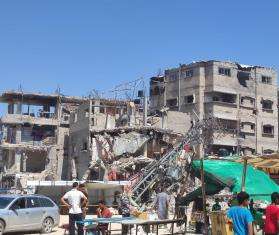Dear Friends,
This past summer, a Doctors Without Borders/Médecins Sans Frontières (MSF) team conducting measles surveillance in Nigeria followed a rumor to a remote village where 40 children had died of a mysterious illness, and more were falling ill.
Team members immediately set up a medical program, calling for additional staff and supplies and then engaging in what amounted to medical detective work in order to learn what was killing these children. This grew into the organization’s first-ever response to an outbreak of lead poisoning.
The team acted in a way that both saved lives and illustrated the kind of leadership and flexibility we want in our operations: the constant questioning at both field level and at MSF’s international offices about how to respond to a given context, how to improve our work, and how to best serve people in need of urgent medical care.
"We continue to argue that improved medicines, diagnostics, and vaccines must be made available to the people who need them most."
This year, that approach has been absolutely necessary, as MSF, with your generous support, has contended with, among other things, natural disasters on a massive scale in Haiti and Pakistan, widespread disease outbreaks in Central America and much of West Africa, large refugee populations in countries like the Republic of Congo and Bangladesh, and conflicts in places such as Somalia and Afghanistan.
The stories and photographs in this year-end issue of Alert speak to this same flexibility and openness to innovation. We can’t solve every problem, but our capacity to adapt and seek out new approaches in ever-evolving situations has made possible some remarkable achievements in some very difficult circumstances.
In Somalia, for example, our 1,300 Somali colleagues are running medical programs in Mogadishu and beyond, with support from colleagues based in Kenya. In Pakistan, MSF teams treated tens of thousands of patients in all four of the country’s provinces after flooding swept the country. In Sudan and the Democratic Republic of Congo, we adapted to the shifts in conflicts and prepared for contingencies that could occur in the year ahead. And in Haiti, when cholera hit a country already battered by an earthquake, MSF staff treated more than 51,000 people for cholera-like symptoms in the first eight weeks of the outbreak.
Simultaneously, we continue to argue that improved medicines, diagnostics, and vaccines must be made available to the people who need them most, and that countries that have the means must continue to support global health initiatives.
We can do this work thanks to the dedication and perseverance of our national and international staff, and thanks to your support. Your commitment allows us to launch, sustain, and improve our programs, and to build on our successes in order to become a more effective organization for the years to come.

Sincerely,
Sophie Delaunay



